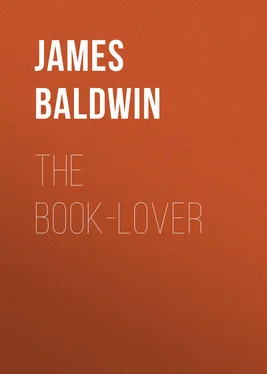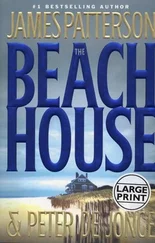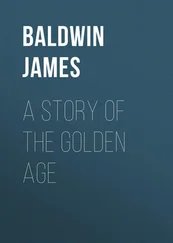James Baldwin - The Book-lover
Здесь есть возможность читать онлайн «James Baldwin - The Book-lover» — ознакомительный отрывок электронной книги совершенно бесплатно, а после прочтения отрывка купить полную версию. В некоторых случаях можно слушать аудио, скачать через торрент в формате fb2 и присутствует краткое содержание. Жанр: foreign_antique, foreign_prose, на английском языке. Описание произведения, (предисловие) а так же отзывы посетителей доступны на портале библиотеки ЛибКат.
- Название:The Book-lover
- Автор:
- Жанр:
- Год:неизвестен
- ISBN:нет данных
- Рейтинг книги:5 / 5. Голосов: 1
-
Избранное:Добавить в избранное
- Отзывы:
-
Ваша оценка:
- 100
- 1
- 2
- 3
- 4
- 5
The Book-lover: краткое содержание, описание и аннотация
Предлагаем к чтению аннотацию, описание, краткое содержание или предисловие (зависит от того, что написал сам автор книги «The Book-lover»). Если вы не нашли необходимую информацию о книге — напишите в комментариях, мы постараемся отыскать её.
The Book-lover — читать онлайн ознакомительный отрывок
Ниже представлен текст книги, разбитый по страницам. Система сохранения места последней прочитанной страницы, позволяет с удобством читать онлайн бесплатно книгу «The Book-lover», без необходимости каждый раз заново искать на чём Вы остановились. Поставьте закладку, и сможете в любой момент перейти на страницу, на которой закончили чтение.
Интервал:
Закладка:
Except a living man, there is nothing more wonderful than a book! – a message to us from the dead, – from human souls whom we never saw, who lived perhaps thousands of miles away; and yet these, on those little sheets of paper, speak to us, amuse us, vivify us, teach us, comfort us, open their hearts to us as brothers. We ought to reverence books, to look at them as useful and mighty things. If they are good and true, … they are the message of Christ, the maker of all things, the teacher of all truth.
Charles Kingsley.Golden volumes! richest treasures!
Objects of delicious pleasures!
You my eyes rejoicing please,
You my hands in rapture seize.
Brilliant wits and musing sages,
Lights who beamed through many ages,
Left to your conscious leaves their story,
And dared to trust you with their glory;
And now their hope of fame achieved,
Dear volumes! – you have not deceived.
CHAPTER I
The choice of books is not the least part of the duty of a scholar. If he would become a man, and worthy to deal with manlike things, he must read only the bravest and noblest books, – books forged at the heart and fashioned by the intellect of a godlike man. – January Searle.
THE most important question for you to ask yourself, be you teacher or scholar, is this: What books shall I read? For him who has inclination to read, there is no dearth of reading matter, and it is obtainable almost for the asking. Books are in a manner thrust upon you almost daily. Shall you read without discrimination whatever comes most readily to hand? As well say that you will accept as a friend and companion every man whom you meet on the street. Shall you read even every good book that comes in your way, simply because it is harmless and interesting? It is not every harmless book, nor indeed every good book, that will make your mind the richer for the reading of it. Never, perhaps, has the right choice of books been more difficult than at present; and never did it behoove more strongly both teachers and scholars to look well to the character of that which they read.
First, then, let us consider what books we are to avoid. All will agree that those which are really and absolutely bad should be shunned as we shun a pestilence. In these last years of the nineteenth century there is no more prolific cause of evil than bad books. There are many books so utterly vile that there is no mistaking their character, and no question as to whether they should be avoided. There are others which are a thousand-fold more dangerous because they come to us disguised, – “wolves in sheep’s clothing,” – affecting a character of harmlessness, if not of sanctity. I have heard those who ought to know better, laugh at the silly jokes of a very silly book, and offer by way of excuse that there was nothing very bad in it. I have heard teachers recommend to their pupils reading matter which, to say the least, was of a very doubtful character. Now, the only excuse that can be offered in such cases is ignorance, – “I didn’t know there was any harm in the book.” But the teacher who through ignorance poisons the moral character and checks the mental growth of his pupils is as guilty of criminal carelessness as the druggist’s clerk who by mistake sells arsenic for quinine. Step down and out of that responsible position which you are in no wise qualified to fill! The direction of the pupils’ habits of reading, the choice of reading matter for them, is by no means the least of the teacher’s duties.
The elder Pliny, eighteen hundred years ago, was accustomed to say that no book was so bad but that some part of it might be read with profit. This may have been true in Pliny’s time; but it is very far from correct now-a-days. A large number of books, and many which attain an immense circulation, are but the embodiment of evil from beginning to end; others, although not absolutely and aggressively bad, contain not a single line that can be read with profit.
What are the sure criterions of a bad book? There is no better authority on this subject than the Rev. Robert Collyer. He says: “If when I read a book about God, I find that it has put Him farther from me; or about man, that it has put me farther from him; or about this universe, that it has shaken down upon it a new look of desolation, turning a green field into a wild moor; or about life, that it has made it seem a little less worth living, on all accounts, than it was; or about moral principles, that they are not quite so clear and strong as they were when this author began to talk; – then I know that on any of these five cardinal things in the life of man, – his relations to God, to his fellows, to the world about him, and the world within him, and the great principles on which all things stable centre, — that , for me, is a bad book. It may chime in with some lurking appetite in my own nature, and so seem to be as sweet as honey to my taste; but it comes to bitter, bad results. It may be food for another; I can say nothing to that. He may be a pine while I am a palm. I only know this, that in these great first things, if the book I read shall touch them at all, it shall touch them to my profit or I will not read it. Right and wrong shall grow more clear; life in and about me more divine; I shall come nearer to my fellows, and God nearer to me, or the thing is a poison. Faust, or Calvin, or Carlyle, if any one of these cardinal things is the grain and the grist of the book, and that is what it comes to when I read it, I am being drugged and poisoned; and the sooner I know it the better. I want bread, and meat, and milk, not brandy, or opium, or hasheesh.” 1 1 Robert Collyer: Addresses and Sermons .
And Robert Southey, the poet, expresses nearly the same thing: “Young readers, – you whose hearts are open, whose understandings are not yet hardened, and whose feelings are not yet exhausted nor encrusted with the world, – take from me a better rule than any professors of criticism will teach you! Would you know whether the tendency of a book is good or evil, examine in what state of mind you lay it down. Has it induced you to suspect that what you have been accustomed to think unlawful may after all be innocent, and that may be harmless which you have hitherto been taught to think dangerous? Has it tended to make you dissatisfied and impatient under the control of others, and disposed you to relax in that self-government without which both the laws of God and man tell us there can be no virtue, and, consequently, no happiness? Has it attempted to abate your admiration and reverence for what is great and good, and to diminish in you the love of your country and your fellow-creatures? Has it addressed itself to your pride, your vanity, your selfishness, or any other of your evil propensities? Has it defiled the imagination with what is loathsome, and shocked the heart with what is monstrous? Has it disturbed the sense of right and wrong which the Creator has implanted in the human soul? If so, if you are conscious of any or all of these effects, or if, having escaped from all, you have felt that such were the effects it was intended to produce, throw the book in the fire, whatever name it may bear in the titlepage! Throw it in the fire, young man, though it should have been the gift of a friend; young lady, away with the whole set, though it should be the prominent furniture of a rosewood bookcase.” 2 2 The Doctor , Interchapter V., 1856.
“It is the case with literature as with life,” says Arthur Schopenhauer, the German philosopher. “Wherever we turn we come upon the incorrigible mob of humankind, whose name is Legion, swarming everywhere, damaging everything, as flies in summer. Hence the multiplicity of bad books, those exuberant weeds of literature which choke the true corn. Such books rob the public of time, money, and attention, which ought properly to belong to good literature and noble aims; and they are written with a view merely to make money or occupation. They are therefore not merely useless, but injurious. Nine tenths of our current literature has no other end but to inveigle a thaler or two out of the public pocket, for which purpose author, publisher, and printer are leagued together… Of bad books we can never read too little; of the good, never too much. The bad are intellectual poison, and undermine the understanding.” 3 3 Arthur Schopenhauer: Parerga und Paralipomena , 1851.
Интервал:
Закладка:
Похожие книги на «The Book-lover»
Представляем Вашему вниманию похожие книги на «The Book-lover» списком для выбора. Мы отобрали схожую по названию и смыслу литературу в надежде предоставить читателям больше вариантов отыскать новые, интересные, ещё непрочитанные произведения.
Обсуждение, отзывы о книге «The Book-lover» и просто собственные мнения читателей. Оставьте ваши комментарии, напишите, что Вы думаете о произведении, его смысле или главных героях. Укажите что конкретно понравилось, а что нет, и почему Вы так считаете.












